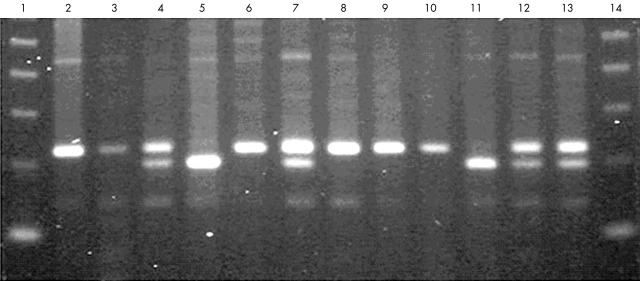Abstract
Objective: To test whether CCR5 d32 polymorphism has a negative association with rheumatoid arthritis in a New Zealand cohort.
Methods: 516 white patients with rheumatoid arthritis and 985 healthy controls were investigated by PCR amplification of the region flanking the known CCR5 d32 deletion, and the frequencies of CCR5 d32 compared. An early rheumatoid arthritis (ERA) cohort of 92 patients was followed prospectively for two years; disease severity and outcome were correlated with CCR5 d32 status.
Results: 12 control subjects (1.2%) were homozygous for d32; no d32 homozygous rheumatoid patients were detected (p = 0.012); 56 patients (10.9%) were heterozygous for the d32 polymorphism (d32/wt), compared with 169 controls (17.2%) (p = 0.0011). The CCR5 d32 allele frequency was lower in the rheumatoid patients than in the controls (frequencies of 0.054 and 0.098, respectively; p = 3.7x10–5). The frequency of CCR5 d32 did not differ significantly according to disease severity or outcome in the prospective ERA cohort, nor with HLA-DRB1 status.
Conclusions: This study provides further evidence for a protective effect of the CCR5 d32 variant on rheumatoid arthritis, consistent with a role for CCR5 and its ligands in disease pathogenesis.
Full Text
The Full Text of this article is available as a PDF (109.6 KB).
Figure 1.
Analysis of CCR5 genotype in rheumatoid arthritis and controls by polymerase chain reaction (PCR). Agarose gel electrophoresis of PCR products. Wild type CCR5 gene PCR amplicon 274 bp, d32 amplicon 242 bp. Lanes 1 and 14, molecular weight markers (123 bp ladder) of 123 bp, 246 bp, 369 bp, etc; lanes 2, 3, 6, 8, 9, and 10, homozygous CCR5 wt/wt; lanes 4, 7, 12, and 13, heterozygous CCR5 d32/wt; lanes 5 and 11, homozygous CCR5 d32/d32 deletion allele.



